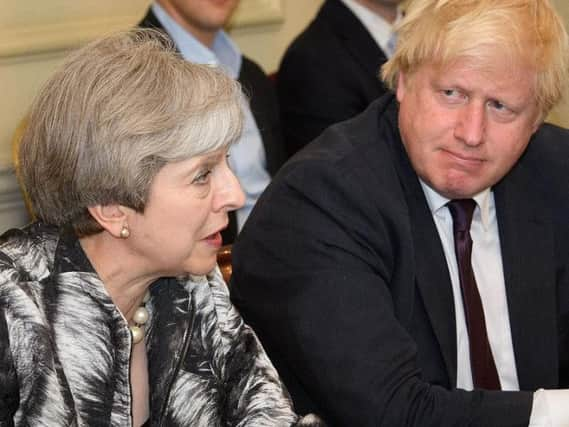Tom Richmond: As Boris goes rogue, May must '˜take back control'


Theresa May under pressure to unify party ahead of major Brexit speechHe would either have been moved to a less sensitive role in the post-election reshuffle that she would have had the authority to preside over – or he would have been sacked this week for the disloyalty generated by that 4,000-word essay on Brexit which is upstaging the PM’s keynote speech in Florence tomorrow.
Yet, because the Tory leader has been left so weakened by her dreadful election miscalculation, Britain is left at the mercy of a Prime Minister with little sense of direction for her government and an unhelpful back-seat driver behaving like a spoilt schoolboy with an over-inflated sense of self-importance.
Advertisement
Hide AdAdvertisement
Hide AdLet’s face facts as the Cabinet prepares to meet for its first meeting since Mr Johnson went rogue. As a seasoned journalist and politician, the Foreign Secretary knew exactly what he was doing when he put pen to paper – and the likely reaction of his over-excitable acolytes who do view their master’s intervention as a leadership marker. To suggest otherwise is being disingenuous.
My intuition is that he was in a huff when sent halfway round the world to meet stricken victims of Hurricane Irma in the Caribbean and found it irksome that he would be missing from key meetings in Downing Street about any transitional arrangements that might be put in place when Britain leaves the European Union in 2019. He found solace in his writing.
After brooding over the summer as Chancellor Philip Hammond, and others, asserted their authority about the need to protect the interests of British business first and foremost, the public face of the Leave campaign felt the need to remind Mrs May – and the country – of his presence and that Brexit means Brexit.
Yet, while the fallout continues to focus on the authenticity, and wording, of the claim that up to £350m a week could be earmarked for the NHS when the country leaves the EU, the Prime Minister only has herself to blame for the pitfalls she’s now encountering on an increasingly regular basis.
Advertisement
Hide AdAdvertisement
Hide AdIt was, let it be remembered, Mrs May who surprised the nation – and probably herself – by appointing her leadership rival as Foreign Secretary in July 2016.
I suspect she did so in the hope that he would be out of the country long enough so not to cause any political mischief, but she should have realised the folly of excluding the Foreign Secretary – the occupant of one of the great offices of state – from the most important foreign policy issue for a generation.
That said, Mr Johnson had an opportunity to make himself indispensable by forging new alliances. It’s what his hero, Winston Churchill, would have done. That many question his very purpose suggest he’s not done so.
Now Mrs May can’t win. If she indulges an act of disloyalty akin to one of Gordon Brown’s attempts to destabilise Tony Blair, the leader who tried to make a virtue of being strong and stable appears even more weak and wobbly. If she sacks him, she alienates a rival – and his unswervingly loyal devotees like the Northern Powerhouse Minister Jake Berry.
Advertisement
Hide AdAdvertisement
Hide AdYet the very fact the Prime Minister is choosing to travel to Florence, birthplace of the Renaissance, to revive her own premiership is also mistaken.
The slogan that resonated in last June’s referendum, other than the aforementioned £350m pledge, was ‘take back control’ and how Parliament would once again become sovereign rather than subservient to Jean-Claude Juncker’s unelected EU dictatorship.
For this reason, Mrs May should be delivering her speech – intended to end the impasse with the EU over the start of trade talks – in the House of Commons where her approach can be scrutinised and challenged by MPs representing every corner of the land.
She thought she could get away with it earlier in the year when she set out a Brexit vision to diplomats at London’s Lancaster House before being told that its far-reaching parameters would require a White Paper in Parliament.
Advertisement
Hide AdAdvertisement
Hide AdBy repeating the same mistake, the PM is either showing a reluctance to work with others – whether it be recalcitrant Cabinet colleagues, Remain devotees or opponents in rival parties – or is unsure of the level of support that she enjoys from her top team.
Neither is a satisfactory state of affairs. This is not about the Tory party, which has been at war over European policy for the best part of three decades. The future of Britain is at stake and, as such, the country has every right to know whether the Cabinet stands by Mrs May’s new position – or not.
As such, the Prime Minister needs to demonstrate that she, and not Boris Johnson, is in control by releasing the contents of her Florence speech to each Cabinet minister and asking them to endorse it. If they don’t, dissenters should resign forthwith. It’s called collective responsibility.
It’s the only way Theresa May will be able to buy herself sufficient time to survive, and possibly advance Brexit, until the next time she faces a challenge to her authority from an errant colleague who has forgotten that the Government’s first duty is to the country and not the Tory party – or their own vanity.
Read more:
Advertisement
Hide AdAdvertisement
Hide Ad